French verbs are essential for speaking and understanding the French language. This page offers a list of the top ten most common French verbs with conjugation charts and example sentences.

Top 10 French Verbs
In the early stages of learning try to focus on the present tense and passé composé. If you are beginner you might find our lesson covering the meanings of different verb tenses to be helpful.
Most Common French Verbs
The top 10 French verbs are: parler (to speak), être (to be), avoir (to have), aller (to go), faire (to make, to do), prendre (to take), venir (to come), pouvoir (can, to be able), vouloir (to want) and mettre (to put).
1) Parler To Speak
We have included parler (to speak) as our first verb because it is the most basic verb in French and almost always the first verb students learn.
Parler is a regular -er verb, which means that the verb endings follow a specific pattern. This page offers a overview of regular French verb conjugations.
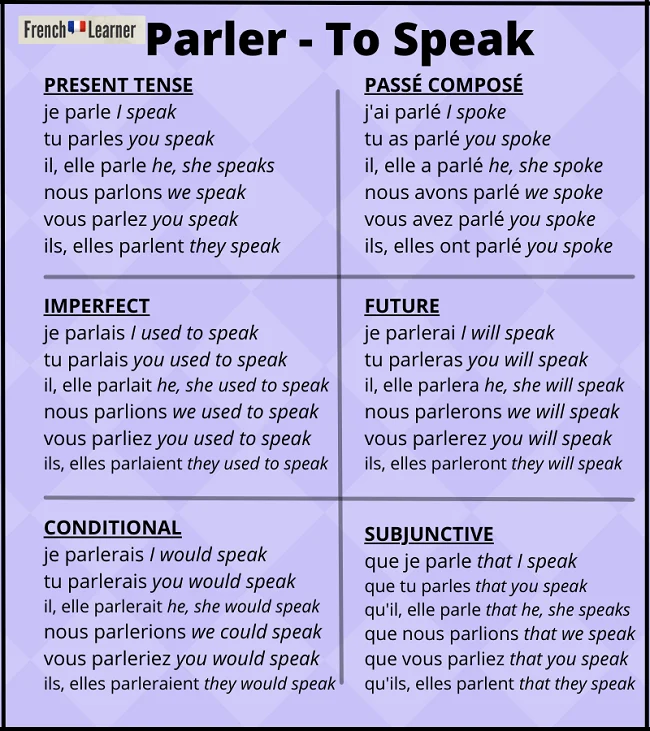
Parler example sentences:
- Je parle français. I speak French.
- Tu ne parles pas allemand. You don’t speak German.
- Parlez-vous anglais ? Do you speak English?
- En Espagne on parle espagnol. People in Spain speak Spanish.
- Elles parlent chinois. They speak Chinese.
This page on our site offers complete conjugation tables of parler with example sentences.
2) Être To Be
The verb être means to be. It is irregular. This means that its conjugation does not follow a set pattern. If you are a beginner focus on memorizing être in the present tense perfectly.
Être is used for describing states of being, location and much more. It is also used when forming the past tense (passé composé) for verbs of movement.
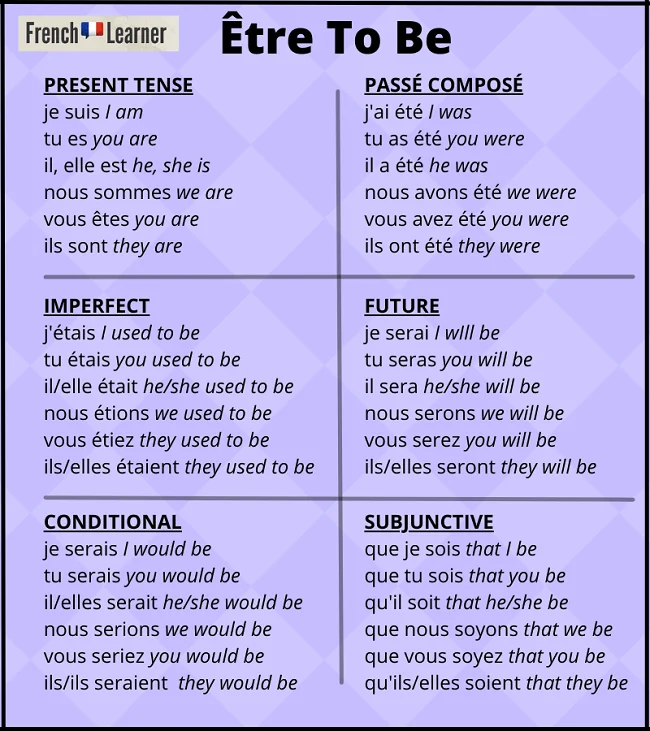
Être examples:
- Je suis en France. I am in France.
- Tu es en retard. You are late.
- Ils sont en classe. They are in class.
- Nous sommes heureux. We are happy.
This page on our site offers complete conjugation charts or être with example sentences.
3) Avoir To Have
The second most useful verb in French is probably avoir, which means to have. In addition to being used in describing having and not having, avoir is used to form the past tense (passé composé) of the majority of French verbs.
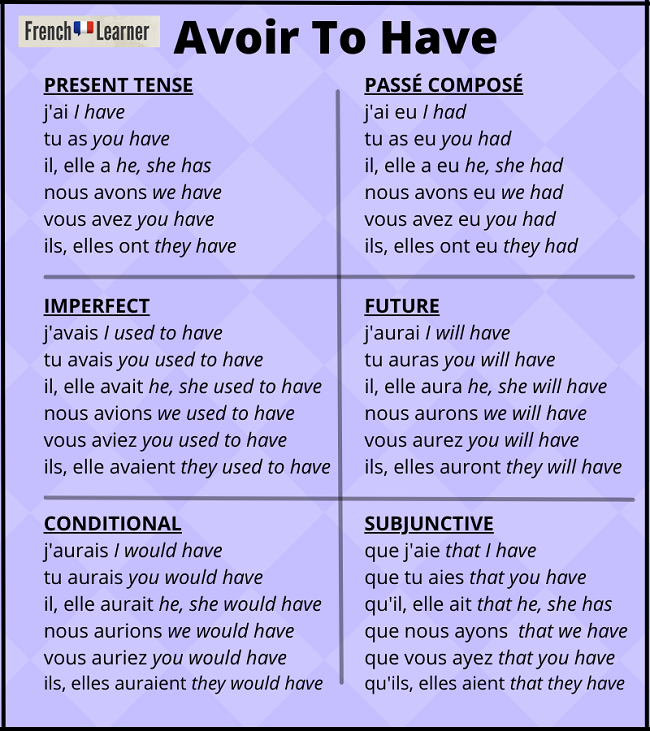
Avoir examples:
- Marie a un chien. Marie has a dog.
- Il a une voiture. He has a car.
- J’ai trente-cinq ans. I am 35 years-old.
- Nous avons faim. We are hungry.
This page on our site offers complete conjugation charts for avoir with example sentences.
4) Aller To go
The verb aller means to go. Use aller to describe where you’re going. Aller is also used to describe how you are doing. For example, Je vais bien means “I’m fine”. This page covers the usage of aller in French greetings.
Another usage of aller is the futur proche or near future tense. For example, Je vais manger (I’m going to eat).
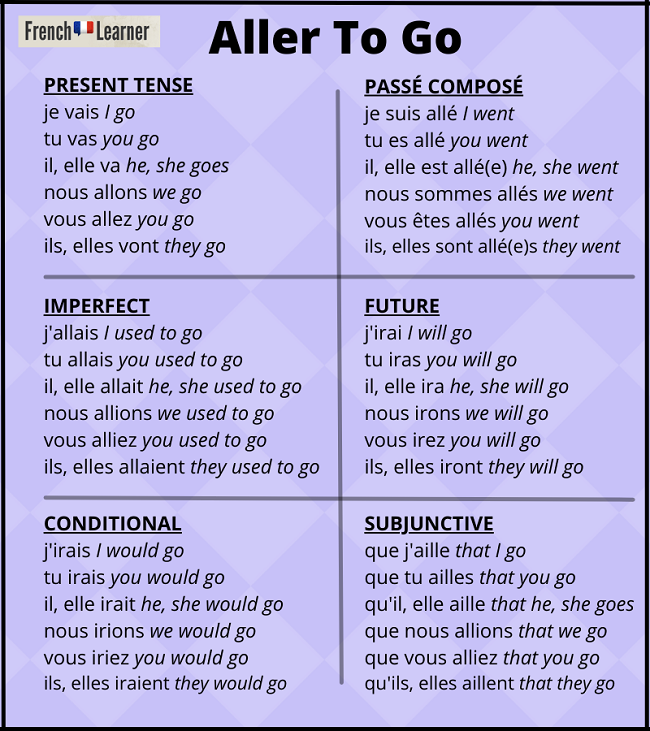
Aller example:
- Je vais en France. I’m going to France.
- Elle va très bien. She’s going very well.
- Nous allons étudier. We’re going to study.
This page on our site offers complete conjugation charts for aller with example sentences.
5) Faire To Make, To Do
The verb faire means both to make and to do. In addition to the most basic usage, Qu’est-ce que tu fais? (What are you going?), it’s also used in an extensive list of expressions. For example, Je fais du shopping (I’m going shopping).
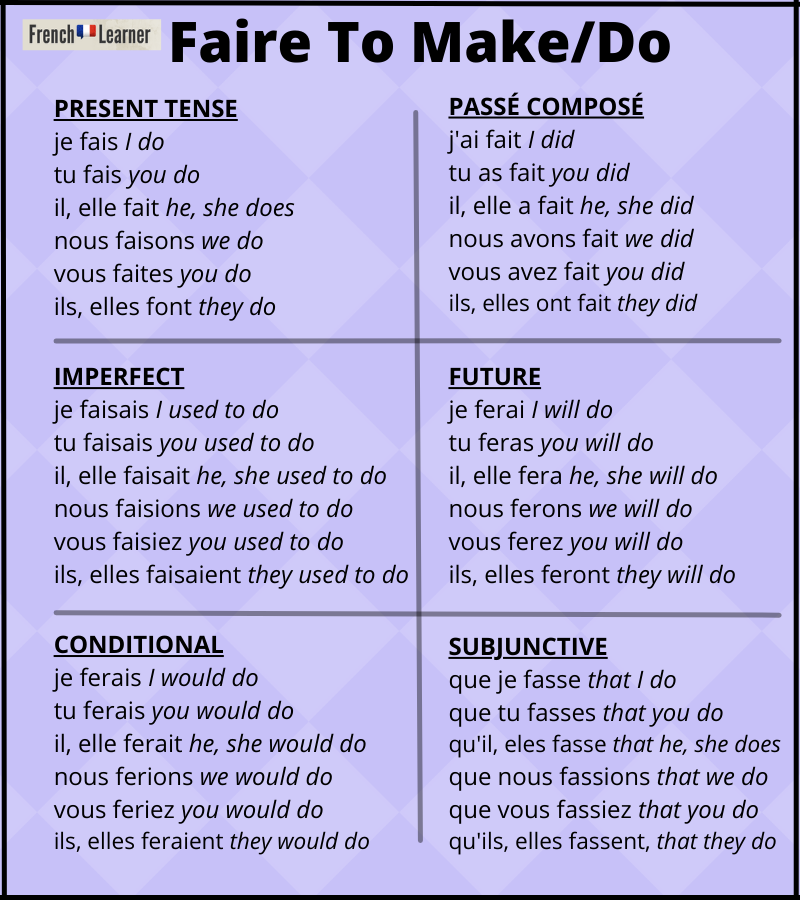
Faire examples:
- Je fais mon travail. I am doing my work.
- Tu fais ton lit. You are making your bed.
- Nous faisons la cuisine. We are cooking.
- Ils font du sport. They are exercising.
This page on our site offers complete conjugation charts for faire with example sentences.
6) Prendre To Take
The verb prendre means to take. In addition to the most basic usage, Je prends mon livre (I take my book), prendre is used in a wide variety of expressions. For example, Je prends un café (I’m having a coffee).
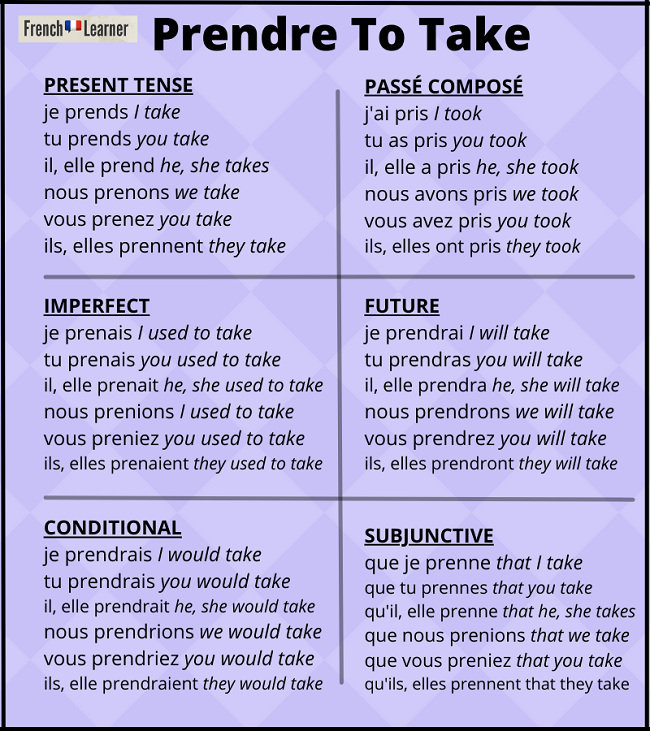
It’s also worth noting that there are several verbs conjugated in the same way as prendre: apprendre (to learn), comprendre (to understand) and entreprendre (to start doing).
Prendre examples:
- Je prends mes clés. I am taking my keys.
- Il prend un taxi. He is taking a taxi.
- Nous prenons notre temps. We are taking our time.
- Ils prennent le train. They are taking the train.
This page on our site offers complete conjugation charts for prendre with example sentences.
7) Venir To come
The verb venir means to come. In addition to the most baic usage, Je viens demain (I’m coming tomorrow), venir is also use in the in the passé récent (recent past), or ‘just’ tense. For example, Je viens de finir (I just finished).
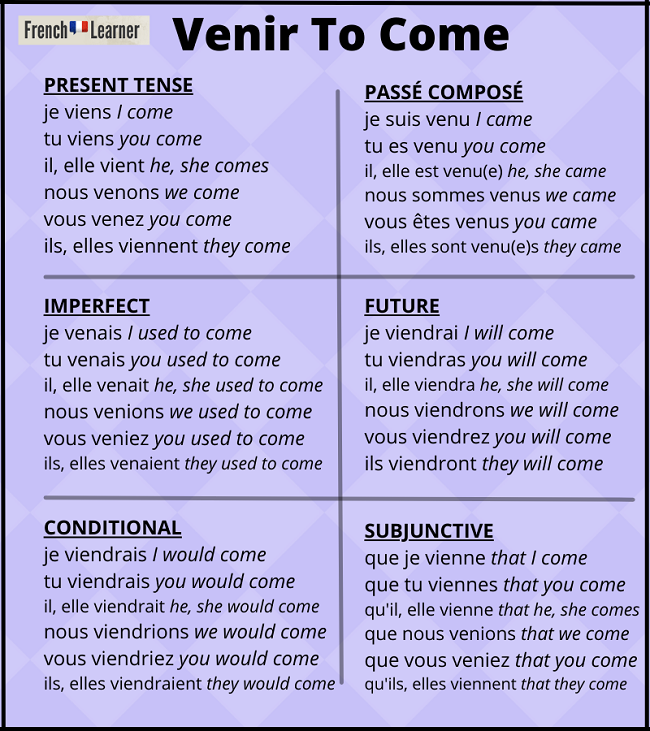
Venir examples:
- Pierre vient avec Marie. Pierre is coming with Marie.
- Nous venons la semaine prochaine. We are coming next week.
- Ils viennent de manger. They just ate.
This page on our site cover complete conjugation charts for venir and this page covers the recent past tense, which uses venir.
8) Pouvoir Can, To Be Able
Pouvoir means both can and to be able. It is followed by an infinitive and is used to express capability. For example, Je peux venir demain (I can come tomorrow).
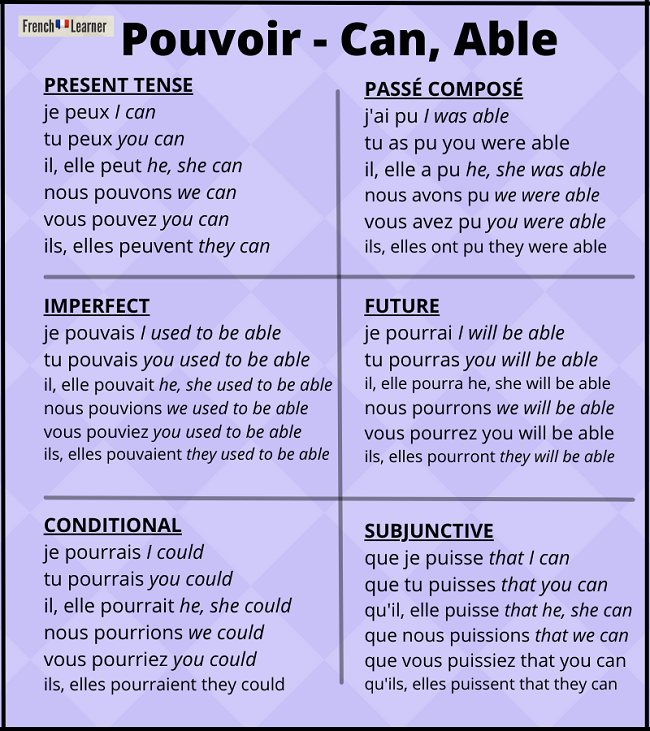
Pouvoir examples:
- Il peut nous aider. He can help us.
- Elle ne peut pas conduire. She cannot drive.
- Ils peuvent travailler. They can work.
This page on our site covers complete conjugation charts for pouvoir with example sentences.
9) Vouloir To Want
The verb vouloir means to want. It can be followed by a noun or infinitive and is associated with willingness. For example, Je veux travailler (I want to work).
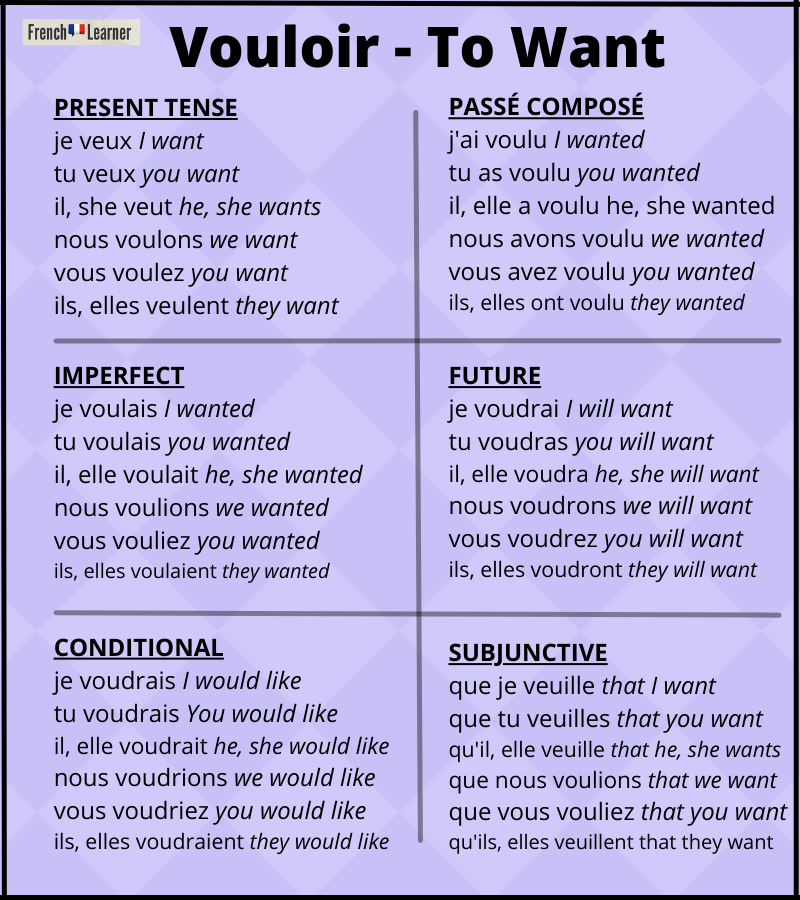
Vouloir examples:
- Je veux manger. I want to eat.
- Ils veulent voyager. They want to travel.
- Elle veut du fromage. She wants some cheese.
- Il veut une pizza. He wants a pizza.
This page on our site offers complete conjugation charts for vouloir with example sentences.
10) Mettre To Put
The very mettre has three meanings: to put, to wear and to turn on. We have included this very in our top-10 list as it is used in many different situations (see example sentences below).
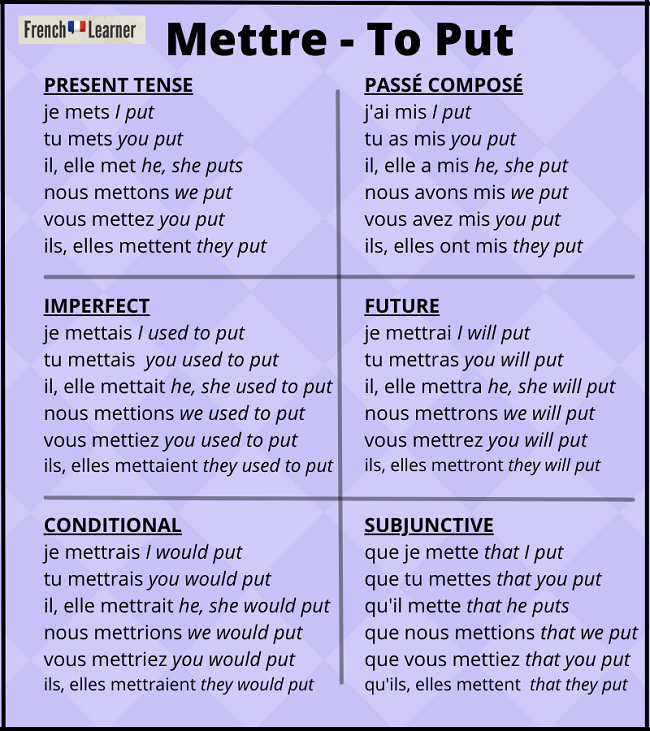
Mettre examples:
- Je mets l’assiette sur la table. I put the plate on the table.
- Il met ses lunettes. He puts on his glasses.
- Elle met la lumière. She turns on the light.
This page explores the conjugation of mettre in detail.
Top 100 most common French Verbs
In the table below we have come up with a list of the top 100 most common French verbs. We have written the verbs out in the first-person singular (je or I) form in the present, passé composé, imperfect and future tenses.
| INFINITIVE | PRESENT TENSE | PASSE COMPOSE | IMPERFECT | FUTURE TENSE |
|---|---|---|---|---|
| acheter – to buy | j’achète | j’ai acheté | j’achetais | j’achèterai |
| aider – to help | j’aide | j’ai aidé | j’aidais | j’aiderai |
| aller – to go | je vais | je suis allé | j’allais | j’irai |
| amener – to bring | j’amène | j’ai amené | j’amenais | j’amènerai |
| apporter – to bring | j’apporte | j’ai apporté | j’apportais | j’apporterai |
| apprendre – to learn | j’apprends | j’ai appris | j’apprenais | j’apprendrai |
| arriver – to arrive | j’arrive | je suis arrivé | j’arrivais | j’arriverai |
| attendre – to wait | j’attends | attendu | j’attendais | j’attendrai |
| avoir – to have | j’ai | j’ai eu | j’avais | j’aurai |
| bavarder – to chat | je bavarde | j’ai bavardé | je bavardais | je bavarderai |
| boire – to drink | je bois | j’ai bu | je buvais | je boirai |
| changer – to change | je change | j’ai changé | je changeais | je changerai |
| chanter – to sing | je chante | j’ai chanté | je chantais | chanterai |
| chercher – to look for | je cherche | j’ai cherché | je cherchais | je chercherai |
| commander – to order | je commande | j’ai commandé | je commandais | je commanderai |
| commencer – to start | je commence | j’ai commencé | je commençais | je commencerai |
| comprendre – to understand | je comprends | j’ai compris | je comprenais | je comprendrai |
| conduire – to drive | je conduis | j’ai conduit | conduisais | je conduirai |
| connaître – to know | je connais | j’ai connu | je connaissais | je connaîtrai |
| courir – to run | je cours | j’ai couru | je courais | je courrai |
| croire – to believe | je crois | j’ai cru | je croyais | je croirai |
| cuisiner – to cook | je cuisine | j’ai cuisiné | je cuisinais | je cuisinerai |
| danser – to dance | je danse | j’ai dansé | je dansais | je danserai |
| décider to decide | je décide | j’ai décidé | je décidais | je déciderai |
| demander – to ask | je demande | j’ai demandé | je demandais | je demanderai |
| déménager – to move | je déménage | j’ai déménagé | je déménageais | je déménagerai |
| dépenser – to spend | je dépense | j’ai dépensé | je dépensais | je dépenserai |
| descendre – to go down | je descends | je suis descendu | je descendais | je descendrai |
| dire – to say | je dis | j’ai dit | je disais | je dirai |
| donner – to give | je donne | j’ai donné | je donnais | je donnerai |
| dormir – to sleep | je dors | j’ai dormi | je dormais | je dormirai |
| écouter – to listen | j’écoute | j’ai écouté | j’écoutais | j’écouterai |
| écrire – to write | j’écris | j’ai écrit | j’écrivais | j’écrirai |
| enlever – to remove | j’enlève | j’ai enlevé | j’enlevais | j’enlèverai |
| entendre – to hear | j’entends | j’ai entendu | j’entendais | j’entendrai |
| envoyer – to send | j’envoie | j’ai envoyé | j’envoyais | j’enverrai |
| essayer – to try | j’essaye | j’ai essayé | j’essayais | j’essaierai |
| être to be | je suis | j’ai été | j’étais | je serai |
| étudier – to study | j’étudie | j’ai étudié | j’étudiais | j’étudierai |
| faire to make, do | je fais | j’ai fait | je faisais | je ferai |
| fermer – to close | je ferme | j’ai fermé | je fermais | je fermerai |
| finir – to finish | je finis | j’ai fini | je finissais | je finirai |
| gagner to win | je gagne | j’ai gagné | je gagnais | je gagnerai |
| gaspiller to waste | je gaspille | j’ai gaspillé | je gaspillais | je gaspillerai |
| goûter to taste | je goûte | j’ai goûté | je goûtais | je goûterai |
| habiter to live | j’habite | j’ai habité | j’habitais | j’habiterai |
| introduire insert, introduce | j’introduis | j’ai introduit | j’introduisais | j’introduirai |
| inviter – to invite | j’invite | j’ai invité | j’invitais | j’inviterai |
| jouer to play | je joue | j’ai joué | je jouais | je jouerai |
| laisser to leave | je laisse | j’ai laissé | je laissais | je laisserai |
| laver to wash | je lave | j’ai lavé | je lavais | je laverai |
| lire to read | je lis | j’ai lu | je lisais | je lirai |
| manger to eat | je mange | j’ai mangé | je mangeais | je mangerai |
| marcher to walk | je marche | j’ai marché | je marchais | je marcherai |
| mettre to put | je mets | j’ai mis | je mettais | je mettrai |
| monter to go up | je monte | je suis monté | je montais | je monterai |
| nettoyer to clean | je nettoie | j’ai nettoyé | je nettoyais | je nettoierai |
| obtenir to obtain | j’obtiens | j’ai obtenu | j’obtenais | j’obtiendrai |
| oublier to forget | j’oublie | j’ai oublié | j’oubliais | j’oublierai |
| ouvrir to open | j’ouvre | j’ai ouvert | j’ouvrais | j’ouvrirai |
| partir – to leave | je pars | je suis parti | je partais | je partirai |
| parler to speak | je parler | j’ai parlé | je parlais | je parlerai |
| passer – to pass, pass by | je passe | je suis/j’ai passé | je passais | je passerai |
| payer to pay | je paie | j’ai payé | je payais | je paierai |
| penser to think | je pense | j’ai pensé | je pensais | je penserai |
| perdre to lose | je perds | j’ai perdu | je perdais | je perdrai |
| porter to carry, wear | je porte | j’ai porté | je portais | je porterai |
| prendre to take | je prends | j’ai pris | je prenais | je prendrai |
| préparer to prepare | je prépare | j’ai préparé | je préparais | je préparerai |
| quitter to leave | je quitte | j’ai quitté | je quittais | je quitterai |
| recevoir to receive | je reçois | j’ai reçu | je recevais | je recevrai |
| recommander to recommend | je recommande | j’ai recommandé | je recommandais | je recommanderai |
| regarder to watch, look at | je regarde | j’ai regardé | je regardais | je regarderai |
| remplir to fill | je remplis | j’ai rempli | je remplissais | je remplirai |
| rendre to visit a person | je rends visite à | j’ai rendu visite à | je rendais visite à | je rendrai visite à |
| réparer to repair | je répare | j’ai réparé | je réparais | je réparerai |
| répondre to answer, reply | je réponds | j’ai répondu | je répondais | je répondrai |
| rire to laugh | je ris | j’ai ri | je riais | je rirai |
| retourner – to return | je retourne | je suis retourné | je retournais | je retournerai |
| savoir to know | je sais | j’ai su | je savais | je saurai |
| se coucher – to go to bed | je me couche | je me suis couché | je me couchais | je me coucherai |
| se laver – to wash oneself | je me lave | je me suis lavé | je me lavais | je me laverai |
| se lever – to get up | je me lève | je me suis levé | je me levais | je me leverai |
| se reposer – to rest | je me repose | je me suis reposé | je me reposais | je me reposerai |
| se souvenir | je me souviens | je me suis souvenu | je me souvenais | je me souviendrai |
| signer to sign | je signe | j’ai signé | je signais | je signerai |
| s’inquiéter – to worry | je m’inquiète | je me suis inquiété | je m’inquiétais | je m’inquiéterai |
| suivre to follow | je suis | j’ai suivi | je suivais | je suivrai |
| trouver to find | je trouve | j’ai trouvé | je trouvais | je trouverai |
| s’asseoir – to sit | je m’assieds | je me suis assis | je m’assseyais | je m’assiérai |
| tomber to fall | je tombe | je suis tombé | je tombais | je tomberai |
| travailler to work | je travaille | j’ai travaillé | je travaillais | je travaillerai |
| utilise to use | j’utilise | j’ai utilisé | j’utilisais | j’utiliserai |
| vendre to sell | je vends | j’ai vendu | je vendais | je vendrai |
| venir – to come | je viens | je suis venu | je venais | je viendrai |
| visiter – to visit | je visite | j’ai visité | je visitais | je visiterai |
| voyager – to travel | je voyage | j’ai voyagé | je voyageais | je voyagerai |
| vouloir – to want | je veux | j’ai voulu | je voulais | je voudrai |
| voir – to see | je vois | j’ai vu | je voyais | je verrai |
Where to go next
Many students find learning French verbs to be very daunting. We have known Camille at French Today for many years and reviewed her French Verb Drills course. We love Camille’s verbs course as she drills them out of order with her real human voice, unlike many other apps and courses. Give it a try!



